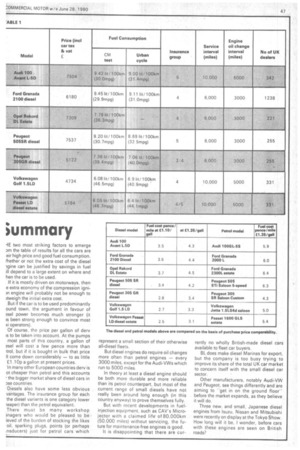;ummary
Page 49

If you've noticed an error in this article please click here to report it so we can fix it.
E WO most striking factors to .emerge am the table of results for all the cars are eir high price and good fuel consumption. fhether or not the extra cost of the diesel lgine can be justified by savings in fuel ill depend to a large extent on where and hen the car is to be used.
If it is mostly driven on motorways, then e extra economy of the compression ignian engine will probably not be enough to itweigh the initial extra cost.
But if the car is to be used predominantly ound town, the argument in favour of asel power becomes much stronger (it is been strong enough to convince most xi operators).
Of course, the price per gallon of dery Ls to be taken into account. At the pumps most parts of this country, a gallon of asel will cost a few pence more than trol, but if it is bought in bulk that price II come down considerably to as little £1.10p a gallon at present prices.
In many other European countries dery is ot cheaper than petrol and this accounts the bigger market share of diesel cars in 3se countries.
Diesels also have some less obvious vantages. The insurance group for each the diesel variants is one category lower leaper) than the petrol equivalent.
There must be many workshop magers who would be pleased to be ieved of the burden of stocking the likes oil, sparking plugs, points (or perhaps Insducers) just for petrol cars which represent a small section of their otherwise all-diesel fleets.
But diesel engines do require oil changes more often than petrol engines every 3000 miles, except for the Audi-VWs which run to 5000 miles.
In theory at least a diesel engine should be both more durable and more reliable than its petrol counterpart, but most of the current range of small diesels have not really been around long enough (in this country anyway) to prove themselves fully.
But with recent developments in fuelinjection equipment, such as CAV's M icrojector with a claimed lifeof 80,000km (50,000 miles) without servicing, the future for maintenance-free engines is good.
It is disappointing that there are cur rently no wholly British-made diesel cars available to fleet car buyers.
BL does make diesel Marinas for export, but the company is too busy trying to improve its share of the total UK car market to concern itself with the small diesel car sector.
Other manufacturers, notably Audi-VW and Peugeot, see things differently and are aiming to "get in on the ground floorbefore the market expands, as they believe it will do.
Three new, and small, Japanese diesel engines from lsuzu, Nissan and Mitsubishi were recently on display at the Tokyo Show. How long will it be, I wonder, before cars with these engines are seen on British roads?




































































































































